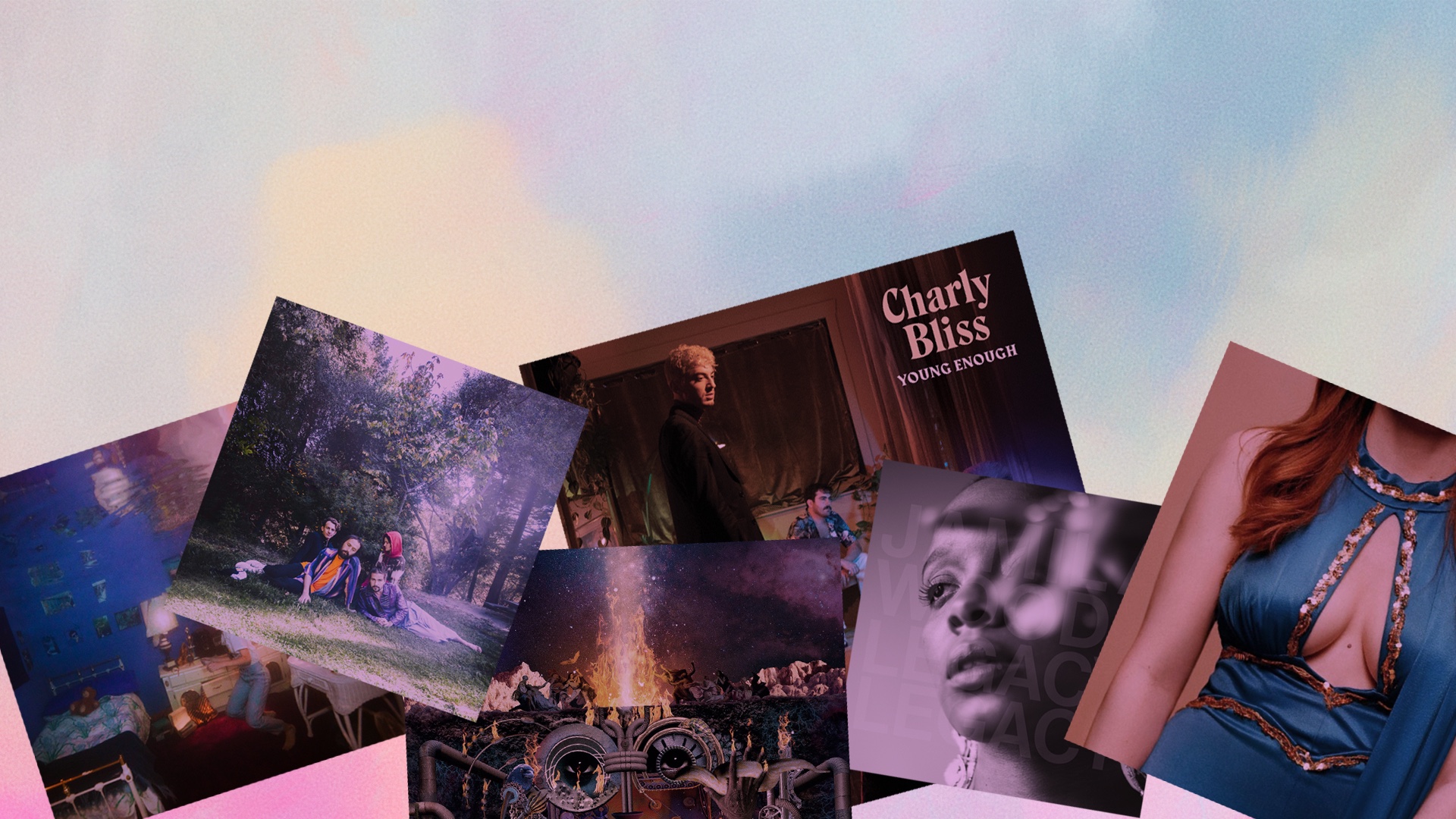As a music publication, it’s our job to serve up a post highlighting the best releases of the past six or twelve months. What winds up happening, though (intentionally or not), is that we also serve up a review of what’s going on in our current cultural moment—there’s a reason why these albums are best-of material, and more often than not it’s because they tap into something that affects us all; they’re the most eloquent expressions of emotional reactions we collectively face, but haven’t heard put into words quite this way before.
But where six months ago we observed a trend in early-twenties female songwriters silencing the out-of-touch male gatekeepers of the industry, the first half of 2019 feels full of entirely more personal revelations. The returns of Sharon Van Etten and Bill Callahan after five years were accompanied by stories of their having children and beginning a life outside of music; Solange and Denzel Curry both gave us visceral elegies to their hometowns, far from relatable for many of us but born of a familiar nostalgia; SASAMI and Jenny Lewis flipped through a rolodex of bad break-ups, both proudly coming out the better party.
Though we’re only halfway through it, 2019 is shaping up to be a serene year for music, focused more on coming to terms with the past and making the most of our future than stressing about the present. Listed below are, for the most part, the twenty-five best examples of what this year has had to offer.
Listen along on Spotify below.
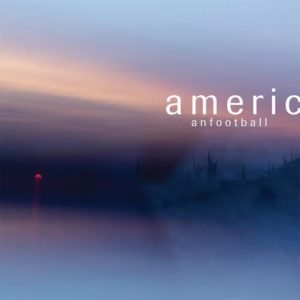
American Football — American Football (LP3)
Midwesterner Mike Kinsella has forever been the emo master, leading that particular charge with seminal mope-core acts such Cap’n Jazz, Joan of Arc, and Owls. American Football was set to be equally seminal until Kinsella shuttered the brassy (literally, considering Steve Lamos’ trumpet) emo act during its initial 1997 to 2000 run. Reactivated in 2014, Kinsella’s Football is now lyrically less emo and more warmly humorous, less glad-to-be-unhappy, and more just weirdly, winsomely funny (we hope), with lines such as “Oh, the muscle memory it must take to stay” coming across as breathlessly snarky as a Bette Davis bon mot. And rather than focus on the curt equations of math rock, American Football’s arrangements have opened themselves, algebraically, to include orchestral percussive elements (vibraphone, bells) and swelling drones on lengthy tracks such as “Silhouettes.” Expansion and laughter, rather than moping around, are the key to LP3. — A.D. Amorosi
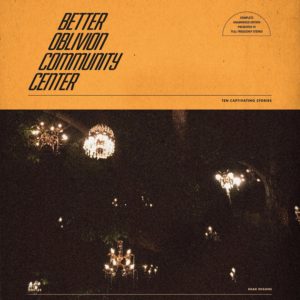
Better Oblivion Community Center — Better Oblivion Community Center
High School Me would’ve been delighted to hear Conor Oberst’s froggy, pain-dappled voice paired up with a frank, wispy lady like Phoebe Bridgers. On their self-titled debut as Better Oblivion Community Center, he’s pushing forty, learned and weary after nearly thirty years in the business, while she’s still in the first bloom of fame at twenty-four—and the intermingling of their fragile dispositions makes good sense. Oberst’s voice is always quivering like the last leaf on an autumn tree, while hers cocoons his like a silver lining, patient as a lullaby. On highlight track “Chesapeake,” they sing softly of the ultimate price of musicianship (“I was all covered in sound / When you asked me to turn it down / Didn’t even think it was loud”) and while the album closer is actually a cover of Mystic Valley Bandmate Taylor Hollingsworth’s “Dominos,” it’s more reminiscent of an OG Bright Eyes tune than anything—especially the drunk, listless-poet lyrics—at least until a fuzzy Nick Zinner guitar solo kicks in and Phoebe’s clear voice takes over, and it becomes a whole different thing. “And if you’re not feeling ready / There’s always tomorrow,” the track concludes, a comforting affirmation for the procrastinators, the cowards, and for all of us, really. — Anya Jaremko-Greenwold

Big Thief — U.F.O.F.
Big Thief have become the dangerous kind of band who write devastating songs that get played in public. It’s always exciting to hear the opening notes of “Shark Smile” play at your favorite coffee shop—but it isn’t long before you realize you need to make a beeline for the exit before singer Adrianne Lenker’s recitation of “ooOoOohh the guard rail” hits, inevitably reducing you to a public fit of tears. It seems the band had their audience’s dignity in mind, though, when they penned U.F.O.F., a commendable sequel to The Best Album of 2017. Where Capacity went straight for the gut, U.F.O.F. is a series of odd deviations, repackaging Lenker’s sudden emotional spasms among her mostly whispered lyrics as jarring shrieks on opener “Contact,” and shaky growls on abysskiss regeneration “From.” What the band offers up on their 4AD debut isn’t just a rehaul of Big Thief—it’s a proposal for a new New Weird America. — Mike LeSuer
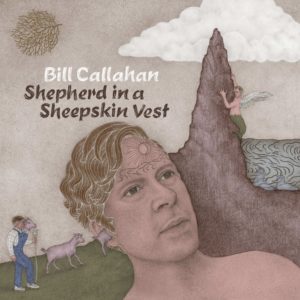
Bill Callahan — Shepherd in a Sheepskin Vest
In 2013, Bill Callahan released Dream River. Since then he got married, released a remix album and a live record, had a kid, and tried to write songs again. The latter took a backseat to learning how to be a father, hence the six years between Dream River and the just-released Shepherd in a Sheepskin Vest. For a while, the songs weren’t coming. And then they did. Callahan’s wry and dry voice is the only constant here; these songs are shorter and there are more of them. It’s a double LP, but it floats along with ease. Like Callahan’s best work, it’s intense but never a burden, a sharp look at the lives we lead and the human condition without judgement. Bill is our greatest observer, a twisted poet for a twisted age. After a half-decade away, he’s returned with little fanfare, aside from a new Twitter account. He knows better than anyone that songs are celebration enough.
— Will Schube

Billy Woods & Kenny Segal — Hiding Places
How long can Billy Woods keep getting better? His streak of flawless LPs has continued undeterred, and Hiding Places with Kenny Segal might be his best yet. A look at his work proves just how unimpeachable an emcee he is. Aside from Woods’ solo work, he’s one half of Armand Hammer (with Elucid), perhaps the strongest duo around right now. With the Ruby Yacht–affiliated producer Segal, though, Woods begins Hiding Places by stepping on your throat. He doesn’t lift his leg until “Red Dust,” the album’s closer and possibly best track, is over. The thing is all heavy beats and heavier rhymes, shit talk for philosophers and drums for metalheads. Woods’ Armand Hammer partner rolls through on “Crawlspace,” and Mothermary and Self Jupiter also make appearances—but this is Woods’ stage. It’s a masterpiece by a certified master, and if things continue to stay on-course, just another notch in a peerless discography. — Will Schube

Cate Le Bon — Reward
Cate Le Bon’s fifth album is a labyrinth, but most listeners won’t immediately know they’re lost inside it. With every spin of the daringly arranged, aching slow-burner “Here It Comes Again,” a new instrument that sounds like it wasn’t present before seems to plead for attention. The grief informing the chorus of the brass-speckled “Daylight Matters” intensifies in scope with each return to that woe-preceding, unforgettable “I love you.” The droning, hymnal “Meet the Man” takes on biblical proportions with repeated listens, and the mystery of what happened to Le Bon in “Miami” grows ever so slightly clearer each time. The album’s labyrinth might have no end, but traversing the maze is your reward. — Max Freedman
Click here to read our feature on Cate Le Bon.
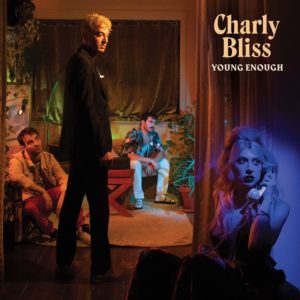
Charly Bliss — Young Enough
To describe Charly Bliss’ second record in memeological terms, Young Enough is the reality of our high school experience juxtaposed with the Taylor Swift discography’s symbolic value as the way we’ve convinced ourselves it transpired nearly a decade later—overly romantic, often comically cliché fantasies of fitting in that inspired no character development whatsoever through our college years. Instead, Eva Hendricks and her band sound like they’re returning to their hometown and flipping through a yearbook, laughing about their youthful foibles and coming to terms with traumas rather than dreading their diminishing cool. Tracks like “Capacity” and “Young Enough” are breezy and sound effortless, seemingly coasting on the raw nostalgia of coming-of-age in the mid-’00s despite all the awkward pratfalls of our romances and handheld technologies. “Remember AIM?” we type into any of a dozen instantly available text boxes on our phones today. “Damn, that was cool.” — Mike LeSuer
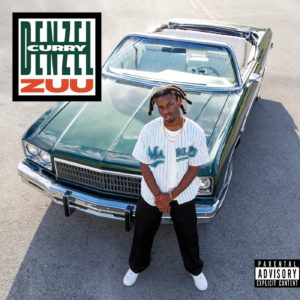
Denzel Curry — ZUU
It seems like it was just a few months ago that Denzel Curry dropped TA13OO (it was!), an epic three-act diegesis venturing deeper into the darkest recesses of the young rapper’s brain. It was a lot to cram into forty-five minutes—something Curry must have picked up on, as his near-immediate follow-up ZUU feels entirely freewheeling over the course of its twenty-nine minutes. “Forget the dilly-dallying,” Curry told HotNewHipHop after revealing that the lyrics for the record were improvised following the “overly complex” TA13OO. Early singles “RICKY” and “SPEEDBOAT” feel informed by a new adherence to parental guidance in the face of tragedy (the former referencing the death of his brother at the hands of police, the latter the death of his friend XXXTentacion), while much of the rest of the record is populated by ludic collaboration with his Miami peers (“Zuu” being a nickname for his native Carol City). More so than anywhere in Curry’s catalog, ZUU accepts the dire circumstances of the artist’s life and contorts them into something impressively free from anxiety. — Mike LeSuer

Flying Lotus — Flamagra
Steven Ellison continues to refine his boundless electronic jazz futures, crafting an album bursting at the seams with ideas. Featuring a cast of collaborators including George Clinton, Solange, Shabazz Palaces, and Anderson .Paak, Flamagra represents an artist exploring the outer reaches of his sound, heading in a million different directions all at once. While that might seem chaotic at surface level, the expert execution blends the panorama of influence into a seamless sonic experience. Future-shocked funk travels the cosmos alongside backpack rap, with Little Dragon dropping in for the delightfully poppy “Spontaneous.” David Lynch provides an ominous commentary to “Fire Is Coming,” and Toro y Moi adds his organic South Carolina vibes to the mix on “9 Carrots.” After this, the sky is the limit for FlyLo. — Scott T. Sterling
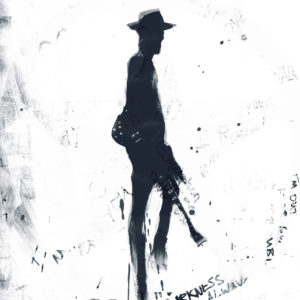
Gary Clark Jr. — This Land
Being pigeonholed as the savior of blues was clearly not enough for Gark Clark Jr. The Austin native has effectively shrugged off expectations with this genre-blurring collection, showcasing other aspects of his vast creative powers. A long-playing lament about the realities of living in America while black, This Land has Clark elevating his game well beyond waiting for the guitar solo. Opening with the scathing title track, it touches on classic Prince-like moments (“Pearl Cadillac”), melodic soul (“The Guitar Man”), seductive R&B (“I Got My Eyes on You (Locked & Loaded)”), and, yes, the blues (“Low Down Rolling Stone,” “What About Us”). Plus, it should go without saying, the guitar-playing across the LP is among the best in the business. — Scott T. Sterling
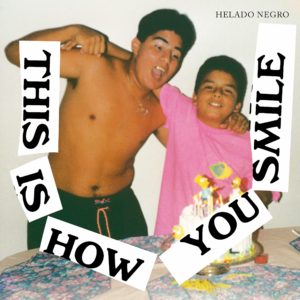
Helado Negro — This Is How You Smile
Juxtaposing a childhood as the son of Ecuadorian-Americans in the hazy confines of South Florida with Jamaica Kincaid’s short story “Girl,” This Is How You Smile is an ambitious undertaking delivered by Helado Negro with grace. His sixth studio effort finds Roberto Carlos Lange delving into pastoral folk filtered through the blurry and sepia-toned lens of nostalgia. The songs defy categorization, with influences as disparate as Boards of Canada, Pharrell Williams, and Devendra Barnhart. With his Latinx identity as the driving force behind the music, this is what warm memories sound like when recalled the right way. — Scott T. Sterling
Click here to read our feature on Helado Negro.
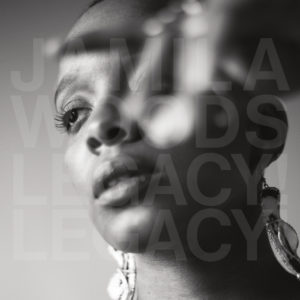
Jamila Woods — LEGACY! LEGACY!
On some alternate timeline, you can hear a truly corny version of Jamila Woods’ LEGACY! LEGACY!, one where her songs for James Baldwin and Eartha Kitt and Betty Davis essentially play out as musical Wikipedia entries or Hamilton-style exposition. But you’ll hear nothing of the sort on the album bequeathed to us in this benevolent reality; though these songs each take up the spirit and legacy of a luminous artist or activist—most but not all of them black Americans—Woods is uninterested in giving us a mausoleum. Instead, she summons a cloud of witnesses, inhabiting these figures in cross-generational dialogue and presenting a full spectrum of black struggle and pride. As a singer, she is ineffably cool. And as a record-maker, she’s blessed with producers who keep everything taut and streamlined, resulting in an R&B album that feels rooted in tradition while still sounding sleek and contemporary. — Josh Hurst

Jenny Lewis — On the Line
Jenny Lewis is a law unto herself. Her voice is good, her songwriting is better, and her red bangs bedeck the brain of a minstrel worshipped by thousands of women who cannot vocalize their own outrage and suffering, thus she does it for them. This year’s solo album deals in grief, written after Lewis ended a twelve-year relationship and found out that her mother was dying. Here she tells stories as a tough troubadour, one who won’t so easily fall apart—though always stained through with a Cali-girl lightness. Lewis was perhaps cuter (musically speaking) back when she sang with Rilo Kiley, but she’s since earned her wisdom. “Little White Dove,” for example, is a strangely groovy tune about seeing her drug-addict mom in the hospital (“Under the holy cross in the valley below / A mother and child, eternity / Under a cool white sheet, here we go”) and in doleful ballad “Taffy,” Jenny recalls a failed relationship with a man she doesn’t regret sending nudes to, because she loved him at the time (“I did so freely and wanted you to see me / Off that throne you put me on”). Album closer “Rabbit Hole” is catchy and full of sass, explaining to an ex that she won’t be partaking in their back-and-forth anymore: “It was a sexual kind of connection / With spiritual undertones / But boy, you had me second guessing / The Beatles and The Rolling Stones,” Jenny zings in one of her classic eviscerations. Life lesson: you don’t want a man making you question your own good taste. — Anya Jaremko-Greenwold
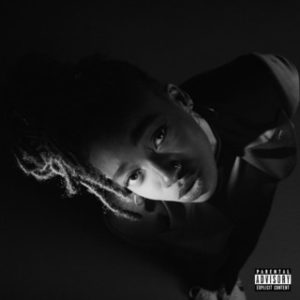
Little Simz — GREY Area
Twenty-four is about the right time for a true coming-of-age album, which is what North London rapper Little Simz, born Simbi Ajikawo, has made with GREY Area. The new record is fraught, charged with angst; Simz is moody and rumbling, with an intensity that seems about to burst, as she raps with measured ire about climate change (“Same motherfuckers that be killin’ off the planet / Are the same fuckers advising you,” she spits on “Pressure”), racial violence, and being an introvert. Simz is deliberate as always in her locution, while the album’s soul and R&B–drawn instrumentals ebb and storm around her. Here, Simz really gets deep on the shadowy part of herself, back to the sinister vibe of tracks like her breakout, “Dead Body”—only maybe more concentrated, more grown up, for example, on album standout “Venom,” an ominous-sounding, violin- and snare-tinged track on which she raps about depression (“If you ever heard what I heard in my mind / Never try, you would cry, that’s a lie, you would die”) and sexism (“From the mere fact that I’ve got ovaries / It’s a woman’s world, so to speak”). With her gripping, grim-but-jazzy sound and razor-sharp lyricism, Little Simz navigates the turmoil that is life in your mid-twenties (especially in the year of our lord 2019), and comes out the other side more solidly herself than ever. — Leah Mandel
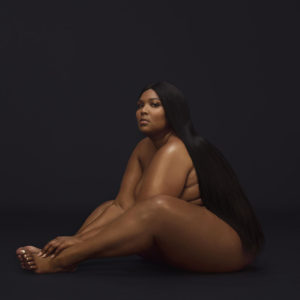
Lizzo — Cuz I Love You
As far as sexy, smart, scuffed-up R&B with a shiny, glossy glow goes, Lizzo is a genre unto herself. Using the same bold, vocal brashness that made her a Playboy pictorial sensation, this powerhouse singer turns hip-hop’s tired misogynistic tropes on their head (“Once upon a time, I was a ho / Trying to open up a little more”) with multiple doses of honesty and sensuality as her lyrical go-tos. From there, Lizzo roams freely atop Hammond B-3 organ jazz kicks and glam rock guitar licks (on the sauntering “Cry Baby”). She plays well with others, as proven with the ribald kitty-cattiness on “Tempo” with guest Missy Elliott. And ultimately, Lizzo shows off pure confidence (“Mirror, mirror on the wall / Don’t say it, ’cause I know I’m cute,” on “Juice”) that goes far beyond any sort of crass audacity. — A.D. Amorosi
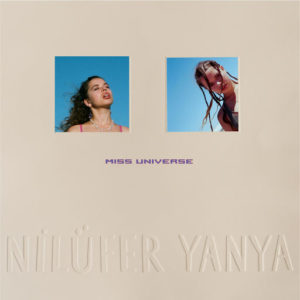
Nilüfer Yanya — Miss Universe
London songwriter Nilüfer Yanya has written a record of glittering pop rock that I’ve already claimed, at least once, will be AOTY. With Yanya’s single “Baby Luv,” one of the best songs of 2018, from her EP Do You Like Pain?, she introduced her mastery of the simple and affecting guitar line—but on this year’s debut full-length, Miss Universe, she takes that to the next level. Vaguely structured around a series of interludes from a futuristic healthcare company called WWAY HEALTH, Yanya’s groovy, inventive songs are focused on the twists and turns of interior well-being. “Think it might take me a week to recover / From this feeling,” she croons next to a sultry bit of saxophone on one absolute jam called “Paradise.” Yanya sings about anxiety, regret, messy-feeling lust, and holding back fears and tears with a casually wise inquisitiveness. She asks questions about herself and her interactions with others. “What are we like?” she wonders on “Safety Net,” a misty, synthy tune about unsuccessful love. “I’m not trying to be someone.” Yanya is mainly interested in how a person’s personal pain affects their approach to living. She seems to suggest that if you can try to understand yourself, perhaps existence in this scary, topsy-turvy world won’t be quite so terrible. All that empathetic acuity serves to make Yanya’s endlessly catchy tunes even more exciting.
— Leah Mandel
Click here to read our feature on Nilüfer Yanya.
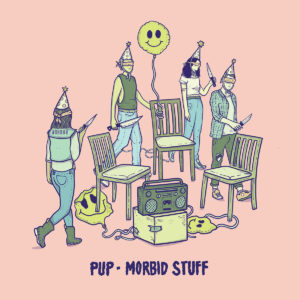
PUP — Morbid Stuff
“I’ve been having some pretty dark thoughts / Yeah, I like them a lot,” wails Stefan Babcock, lead vocalist and guitarist of Toronto punk group PUP on “Scorpion Hill,” singing about those times when you’re so submerged in the blue funk you start to accept it, to make it your world. The track is from their third album, Morbid Thoughts (an apt title for these wittily self-aware, death-obsessed songs), which starts out folky and bursts into some of PUP’s most cathartic pop punk ever. On this record, Babcock’s deepest depressive musings are spotlighted: “I’m still a loser and always will be,” he screams on self-deprecating hardcore track “Full Blown Meltdown”; on “Bare Hands,” he tries going vegan and takes up meditation in an attempt to escape the “hell of [his] own creation”; on “Free at Last” he chastises himself for his own bad feelings with the chorus, “Just ’cause you’re sad again, it doesn’t make you special at all.” We’ve all been bummed, but especially for those of us who’ve experienced that all-consuming, damp, dark, cave of depression—the kind where you hate yourself for being so pathetic—listening to Morbid Thoughts is like being seen. The best part is that these songs rip so hard, with such a buoyant, collective energy, they also sound like the light at the end of that cave. — Leah Mandel
Click here to read our feature on PUP.

SASAMI — SASAMI
No wonder Sasami Ashworth sometimes delivers her stage banter in an alien voice: To listen to the dour, greyscale rock songs of SASAMI is to learn what it’s like to live and love as a human on earth. On “Morning Comes,” she alternates quiet, driving verses with sweeping, blood-boiling choruses and implores her former lover to move the fuck on. On “Pacify My Heart,” she treads a sluggish pattern of melancholic guitar plucks toward accepting that she and an ex will never quite be on the same page (plus, “Sometimes I wish I never met you” is the best opening-line burn since last year’s winner in the category, Forth Wanderers’ “Nevermine”). Both tracks end in extended, harrowing guitar outros that wordlessly depict Ashworth’s respective growth and ire and mark two of the album’s most cathartic stretches. SASAMI, it turns out, is human after all. — Max Freedman
Click here to read our feature on SASAMI.

Sharon Van Etten — Remind Me Tomorrow
The cover of Sharon Van Etten’s fifth record is a kid’s room in chaos: there’s toys and colorful junk everywhere, a baby in a diaper leaning against a crib, and a young girl wearing only a plastic tiara, the last of whom I’d hazard a guess is meant to be Van Etten’s spiritual familiar. Perhaps it mirrors the youthful narrative of many songs on Remind Me Tomorrow, depicting stuff that happened in the singer’s teens and twenties (she’s thirty-eight now). Before writing it, she scored film and TV, got bitten by the acting bug, went back to school for psychology, and had a kid; all of which presumably helped her along in self-reflection, encouraging a return to bruised roots and early years. Laced with unusually ominous synths and beats, Van Etten’s voice is sleepier and sludgier here than ever—like she’s mid-yawn, but in a sexy, primal way—and on languorous opener “I Told You Everything,” she seems to promise pure confession to both a faceless lover and to us, the listeners. On record standout “Seventeen,” Van Etten wants to comfort a younger version of herself, which is sadly impossible across space and time (“I see you so uncomfortably alone / I wish I could show you how much you’ve grown”)—and yet it doesn’t seem like she regrets the things she’s seen and done. She has something now that can only be earned with age and labor: her own glorious autonomy. — Anya Jaremko-Greenwold
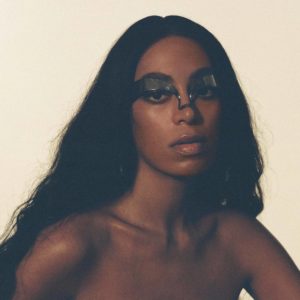
Solange — When I Get Home
For her fourth studio album and the follow-up to her empowered 2016 nu-soul smash, A Seat at the Table, Solange (the toast of Houston), takes her time and luxuriates over a set of experimental atmospheres, gentle hip-hop touches, and Alice Coltrane-ish jazz to evoke memories and conjure images of her hometown. That’s a lot to want to do with a single album, whose principle responsibility is to follow up a hit that yielded a signature (and frankly, caused the world to sit up and realize that Beyoncé isn’t the only talented Knowles). Yet, there is a grace and command to Solange’s Home, as if she is free from any sonic stricture, or necessity to replicate her past (hits and beyond) in any way. With that, this album is the Houston she wishes to picture, all ambient whooshes and horse hoof clomping pulses with a spirituality and serenity that is impossible not to envy.
— A.D. Amorosi
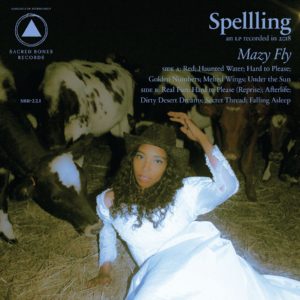
SPELLLING — Mazy Fly
I don’t know why Hollywood keeps making these near-propagandistic space race biopics when, fifty years after 2001, there’s still so much more potential in stories about what the fuck is actually going on up in the sky. For the non-astronomers among us, space is both an abstract concept (to some of us more than others) and an infinite source of creativity. Music hasn’t done much to explicitly tap into this energy (“space rock” is mostly a drug thing, if not a conspiracy thing), which makes SPELLLING’s Mazy Fly all the more welcome. While Tia Cabral’s synthesizers often conjure black-and-white images of close encounters, singles “Haunted Water” and “Under the Sun” feel truer to the ineffable wonder of the universe outside our terrestrial existence, both musically and lyrically. “Flirting with the sky at night,” Cabral coos on “Secret Thread,” an apt summation of the record’s ethos. — Mike LeSuer
Click here to read our feature on SPELLLING.

Stella Donnelly — Beware of the Dogs
On Beware of the Dogs, Stella Donnelly makes taking down shitty people—mostly creepy dudes who sexually harass and assault women and other marginalized people—sound fun. “Old Man” is such a breezy, destined-for-summer affair that lyrics such as “Your personality traits / Don’t count if you put your dick in someone’s face” might go unnoticed if they weren’t so startlingly incisive. “Season’s Greetings” is utterly sprightly for a no-distortion rock song about that boorish family member who ruins the holiday with right-wing political commentary (and “My mom’s still a punk / And you’re just shit” is a dunk for the ages). Not everything is so bright and cheery, however: midway through the album, Donnelly’s breakout ballad “Boys Will Be Boys” reappears, still as heartwrenching and detailed a recount of sexual assault and victim-blaming as it ever was. Even when she’s having a good time, Donnelly remembers to beware. — Max Freedman
Click here to read our feature on Stella Donnelly.
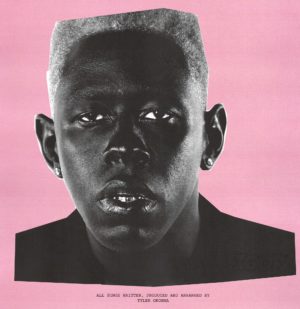
Tyler, the Creator has always hinted at being more than a rapper. At least, that’s how he’s envisioned and positioned himself. He was the architect of Odd Future, an excavator of talent that saw him working with Earl Sweatshirt, Vince Staples, Syd, Frank Ocean, and more. He scored films and made records that sounded like N.E.R.D. meets Gang Starr. Tyler has always been a jigsaw puzzle with a few missing pieces. 2017’s Flower Boy was the closest he came to an apex, laying the groundwork for the house he’d always envisioned his career would live in. With IGOR, though, Tyler’s renovated the property and turned it into an empire. It’s loose and playful like his personality, breathtakingly assured like his ego. It’s everything Tyler’s been working toward, the glorious messes of his early LPs coupled with refined songwriting chops. Here, Tyler is less a mastermind and more a shepherd leading his followers and collaborators to a promised land. — Will Schube
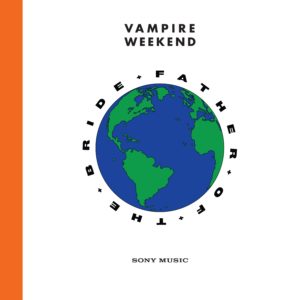
Vampire Weekend — Father of the Bride
“One rich man in ten has a satisfied mind—and I’m the one,” boasts Ezra Koenig midway through the fourth Vampire Weekend record. Maybe he’s telling the truth, but on an album that repeatedly references affluence and privilege, he never sounds satisfied. In fact, he sounds jittery throughout, worrying over crumbling institutions, stuttering relationships, and ecological apocalypse. The lyrics are almost uniformly neurotic and the songs almost uniformly buoyant, their major chords and peppy rhythms belying the anguish at their core. Maybe Koenig is having a crisis, or maybe he’s just giving voice to a distinctly millennial malaise. Either way, Father of the Bride feels, more than ever, like his baby: Not a full band record so much as the studio opus of a mad genius and his revolving cast of collaborators, intent on mining the struggle for whatever flashes of inspiration they can find. — Josh Hurst
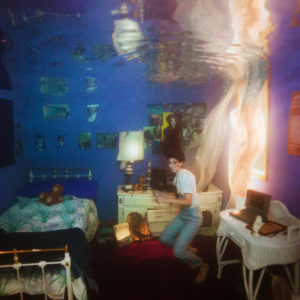
Weyes Blood — Titanic Rising
“At night, I just lay down and cry,” Natalie Mering intones dramatically on the transcendent, string-flanked chorus of “Something to Believe,” the centerpiece of her fourth and most uncompromising album to date as Weyes Blood. Across most of the LP, though, Mering does exactly the opposite of crying, opting instead to tackle the terrors of climate change, internet dating, and other modern maladies with optimism. On “Everyday,” she pokes fun at the Tinder generation by riding an inescapable piano groove into a jovial, harmony-heavy chorus. On “A Lot’s Gonna Change,” strings and pianos flutter gorgeously around Mering, commanding her younger self not to fear the future. On “Movies,” when she sings “You’ll be the star / You know you are” as the song begins its ascent from suspenseful synth rippling toward bombastic cello surges and just-off-beat kick drum hits, she elicits a similar beacon of hope. It might just make you cry.
— Max Freedman

